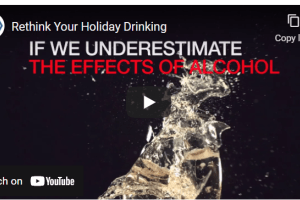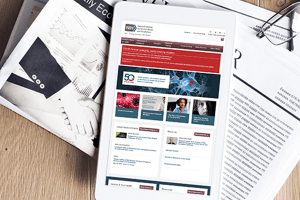National Institute on Alcohol Abuse and Alcoholism (NIAAA)
| Did you know that language commonly used to describe alcohol misuse and alcohol use disorder (AUD) can influence treatment outcomes in people suffering from alcohol problems? Yes, that can often be the case. In fact, the stigma perpetuated by such language can decrease a person’s motivation to seek help for an alcohol problem
| Happy Saint Patrick’s Day! Because drinking alcohol is a large part of the St. Patrick’s Day festivities for many people, this is a good time to be mindful of how alcohol can impact your celebrations and your health.
| The holidays are a time for celebration and alcohol is often present at festive gatherings. Despite all good plans, people may consume alcohol more than they intended.
| Supporting research to better understand and address alcohol-related health disparities and improve the health of underserved populations is one of the highest priorities of the National Institute on Alcohol Abuse and Alcoholism (NIAAA).
| We can help alleviate the stigma associated with alcohol-related conditions by consistently using non-pejorative, non-stigmatizing, person-first language to describe these concerns and the people who are affected by them. Keep in mind that some words that are commonly used in society, such as “alcoholic” and “alcohol abuse,” can be stigmatizing.
| The National Institute on Alcohol Abuse and Alcoholism (NIAAA) is currently developing a new Strategic Plan to highlight priorities and guide activities for advancing the Institute’s mission over the next five years.
| We are profoundly saddened at the passing of Dr. Mary Jeanne Kreek last week, at age 84.
| Issues of racial equity and inclusion weigh heavily on me as I contemplate the future of alcohol research. While NIAAA has been and is committed to addressing issues of racial equity and inclusion at all levels, these concerns, even though sincere and long-standing, ring hollow if they are not supported by action – bold, proactive, and committed action to ending racial inequities across the biomedical research enterprise. And let us be clear that our circumstances require transformative changes in our biomedical research ecosystem.
| It’s always a good idea to periodically examine your relationship with alcohol. A popular way to do this is to participate in a sober month like Dry January or Sober October, which are health and wellness trends that emphasizes taking a break from alcohol for an entire month.
| This December marks the 50th anniversary of the creation of the National Institute on Alcohol Abuse and Alcoholism (NIAAA). As I look back over the past five decades, I am proud of our tremendous accomplishments and the progress we have made in alcohol research.











